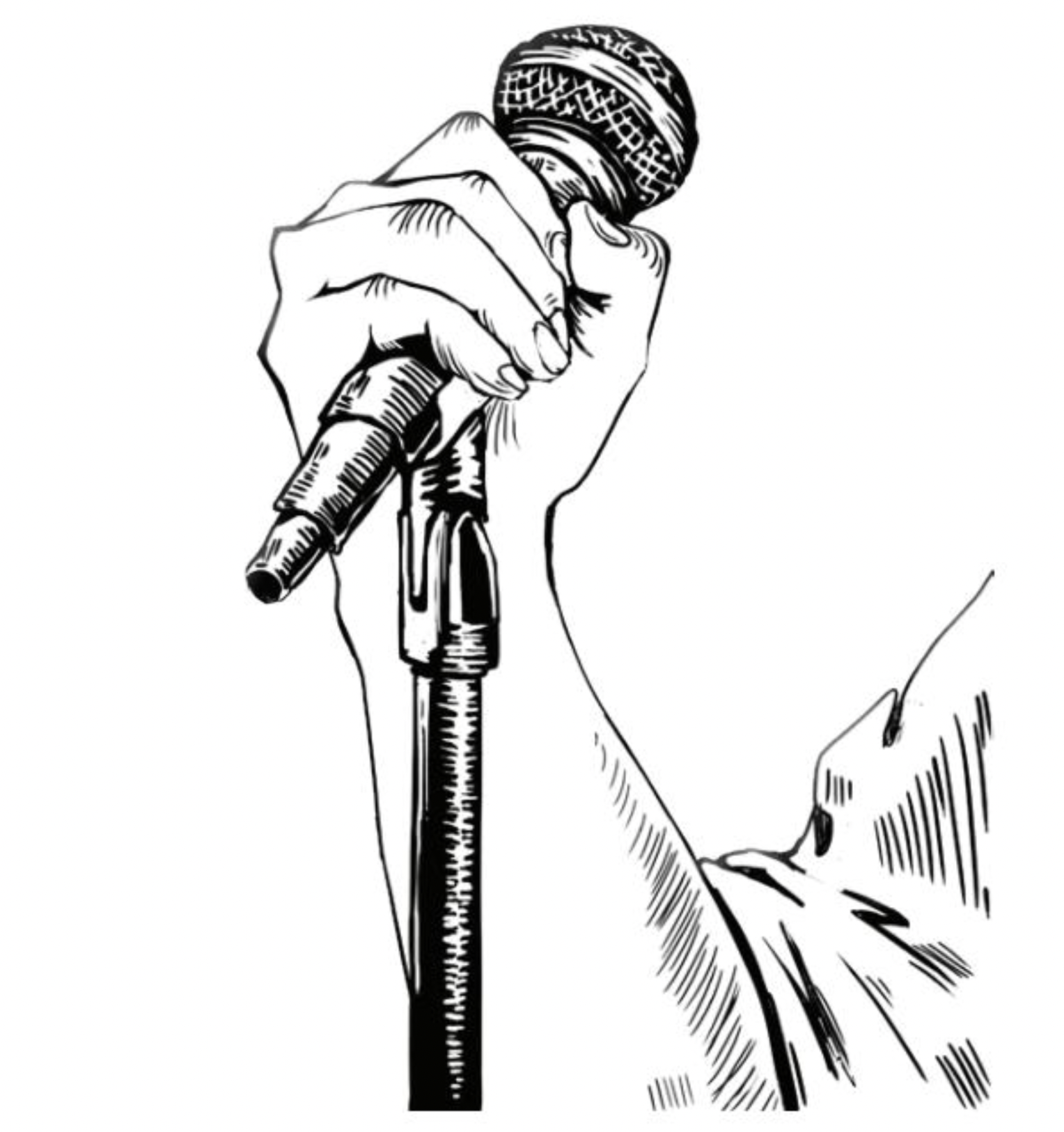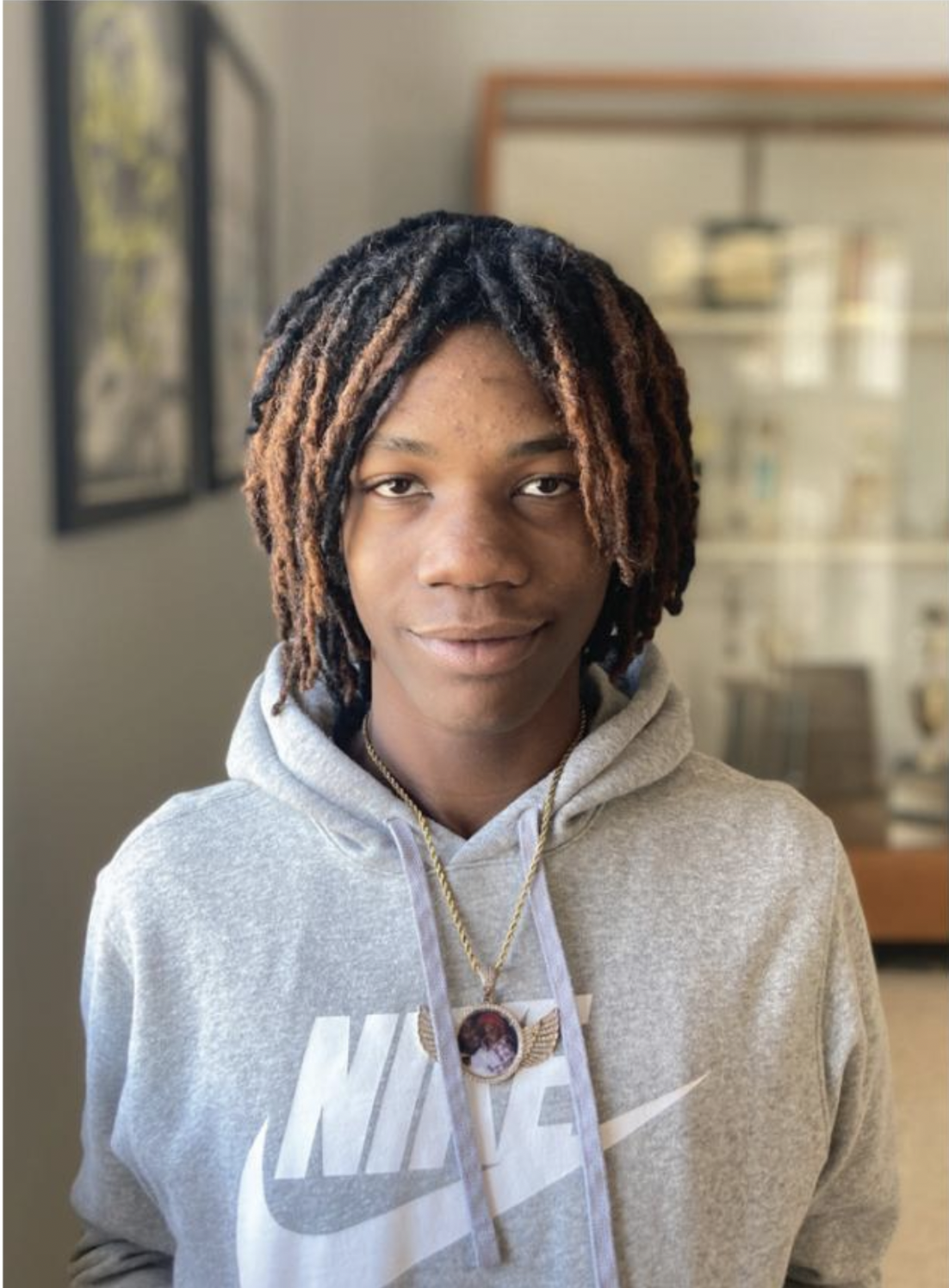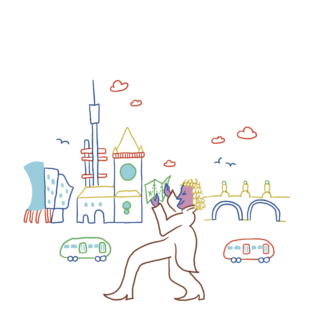It’s a full house in the gym of High School in the Community. Tennis shoes squeak as students file into silver rows of bleachers. The air fills with the chatter of three hundred high schoolers left to their own devices.
In front of the crowd is Keiantae, a 16-year-old student rapper about to perform at his school’s Black History Month pep rally.
“I try not to really look at people because when I do I get nervous,” he told me after the show.
But this time, Keiantae can’t resist. As he gazes up from the shiny linoleum flooring, he is met with hundreds of eyes.
Giving a nod to the sound technician, Keiantae takes a deep breath and grips the mic.

Keiantae isn’t just any rapper, he’s a student poet. He’s been honing his craft in The Word, a literary arts program that has operated for twelve years in New Haven. The Word’s goal is to facilitate a radically inclusive writing and performance environment grounded in poetry, rap, and song. Every week, the group hosts “Writing Liberation Workshops” at the Neighborhood Music School—the group’s home base—and in-class poetry workshops in New Haven Public Schools, where students receive guidance on crafting poetry.
It is these workshops that brought me to Keiantae one winter morning in the “Introduction to Poetry” class of MarcAnthony Solli ’91.
In freezing weather, teens crept into class. Icy shoes scuffled along wooden floorboards as the first bell of the school day rang. One final student walked in late and found a seat in the back, a crumpled brown bag of McDonald’s peeking out from his backpack.
Shortly after, Tarishi “M.I.D.N.I.G.H.T.” Schuler entered, dressed in bright crimson red glasses and a hoodie to match. Tarishi is the current artistic director of The Word and the leader of today’s poetry workshop.
“M.I.D.N.I.G.H.T. is a pseudonym,” he told me. “It’s an acronym for a name I gave myself in my late teens. It stands for ‘Messiah Is Dominant Now Inspired God Helps Tarishi.’ I was born in 1976 when Alex Haley came out with Roots and a lot of parents were naming their children African names…I didn’t know until my early thirties, my name Tarishi is Swahili for “messenger.” So I ended up being a poet not knowing that’s what my name meant.”
Tarishi, unfazed by the yawning class of sleepy high schoolers, asked for everyone in the room to stand. Chairs squeaked, heads rose, and shoulders slouched across the classroom as fifteen pairs of groggy eyes turned toward the smiling poet.
“Repeat after me,” Tarishi said before clearing his throat. “MEeeeee, MIiiiiii, MOOooooooooo!”
Giggles and laughs fluttered through the air as the students exchanged amused glances. This wasn’t what they had expected.
“He brings life to his poems,” one of the high-schoolers told me after class. “His personality is contagious!” another said.
The mood shifted. One by one, students shared their own poems, greeted with applause from the rest of the class. Tarishi let the students put on their best “poetry-writing music” on the class computer, which the kids used as an opportunity to suggest their favorite new TikTok songs. Students raised their hands nervously, then quickly lowered them when Tarishi jokingly cold-called them to present. If students were too nervous (which they often were), Tarisihi recited his own poems first.
Keiantae sat quietly in the back of the classroom. His hoodie hid two clandestine white airpods looping the drill beat to his newest poem titled “I Have a Dream” for the upcoming pep rally.
“M.I.D.N.I.G.H.T.’s a cool dude, and he’s so into it. I can’t explain it,” Keiantae told me. “It’s like he brings a different type of energy, and I mess with it.”
Keiantae is part of a new initiative by The Word. He is one of four New Haven Public School teens selected for a program that trains and hires students to become teaching artists like Tarishi. The fourteen-week program, which pays students $25 an hour during training, offers hands-on experiences led by mentors. Participants learn how to create course curriculums, lead workshops, and gel with other students in the program. These skills prepare them to eventually serve as independent teaching artists in New Haven.
When I asked him about his classroom’s partnership with The Word, High School in the Community teacher MarcAnthony could not understate its importance.

“It is nothing short of curriculum changing… allowing the curriculum to become a living, tangible, real thing for students where they see someone performing at the highest level of their art,” he says. “And that it is accessible. Right in front of them. Right down the street on Audubon Street.”
Keiantae sees The Word as a space to engage with his art and process hardship.
“New Haven is basically a place you want to get out of,” Keiantae said. “In order for me to make New Haven better, something’s gotta give, something’s gotta change.”
Keiantae first started rapping at the age of 12 after the loss of his father to gun violence.
“I rap about the minor setbacks to a major comeback,” Keiantae said. This adage seems to also be the theme of The Word.
On the first day we met, Tarishi and I sat across from each other in the Neighborhood Music School, about a mile away from High School in the Community. Students meet here weekly to practice for poetry slams and participate in Writing Liberation Workshops.
The day I visited was different than usual. The snack bowl of Goldfish, pretzels, and other goodies was still full. In the room, no one was there but me, Tarishi, and one student-poet, Maximilian, who was also experiencing The Word for the first time.
Low turnout has plagued The Word since the start of the pandemic. “A lot of people have been struggling with after-school programs,” Tarishi said, sliding me a pack of gummies. COVID-19 has imposed hardships on previous attendees of The Word: students lack the time to make art as they scramble to find jobs to support families—not to mention the anxiety that comes with moving out of social isolation and trying to resume “normal” life with face-to-face interactions.
“But I feel like we are making a lot of progress and strides in the in-school workshops,” he said, referencing the in-class poetry workshops that The Word currently leads in eight public middle and high schools in New Haven.
Back in the gym of High School in the Community, students rise from their seats. Bodies sway and phones flash to the beat. Keiantae looks out to a sea of sparkling lights. As he raps the lyrics he perfected in The Word’s in-class workshop, he announces: “Alright, now I know that y’all mess with it. Let me really give y’all a show.”
— Kingson Wills is a sophomore in Silliman College.
Illustration by Angela Huo and Photograph by Chris de Santis.


